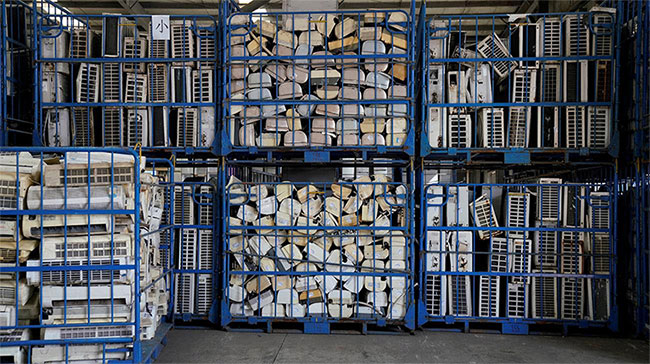More than a billion people around the world will lack air conditioning and refrigerators
making people struggle to find ways to stay warm and cool.
Researchers calculate more than a billion people around the world are at risk of deficiency and to meet the needs of previous food cooling and storage, Reuters reported. Demand for electricity is also increasing due to climate change, unless power plants move from cleaner to energy, according to the non-profit organization SEforAll.
Data from the report estimated that 1.1 billion people in Asia, Africa and Latin America were affected, of which 470 million were in rural areas and 630 million were residents in slums. cities. This ratio falls to about one seventh of the 7.6 billion people living on Earth.

A recycling air conditioner depot in Guiyu town, Guangdong province, China, the area is considered the world's largest electronic scrap warehouse.(Photo: Reuters).
"Cooling is becoming increasingly important in dealing with climate change," said Rachel Kyte, SEforAll's leader and UN climate change envoy. In the survey of 52 countries, countries with the highest risk include India, China, Mozambique, Sudan, Nigeria, Brazil, Pakistan, Indonesia and Bangladesh.
"We have to provide cooling devices in a super efficient way , " Kyte said. According to her, companies can find and exploit large markets such as developing high-performance air conditioners at low cost to sell to the middle class in developing tropical countries. Some simpler solutions are also offered, such as light-colored roof paint to avoid absorbing sunlight or redesigning the building to allow heat to escape faster.
The UN health agency said climate change-related diseases could cause an additional 38,000 deaths a year worldwide from 2030 to 2050. In the May heat wave, more than 60 people death in Karachi, Pakistan when heat rises above 40 degrees C.
In remote areas of tropical countries, many people lack electricity. Conventional clinics cannot store vaccines nor chill some specialized medicines. In the slums of many cities, power supplies are frequently interrupted.
Farmers or fishermen lack cold storage equipment to preserve and transport products to the market. Fresh fish will be rotten within a few hours if stored at 30 degrees C but will be fresh for many days when chilled.
Last week, the University of Birmingham study in England predicted that the number of cooling devices could quadruple to 14 billion worldwide in 2050. Energy consumption will also increase accordingly.
- Found a refrigerator from ancient Rome?
- The first stadium in the world equipped with air conditioning
- Portable multi-function refrigerators
- More than one billion people lack clean water by 2050
- How to fix when the air conditioner is flashing
- How are refrigerators produced?
- The most unique refrigerators in the world
- 50% of the world's population lacks fresh water by 2050
- German scientist found a way to turn air conditioning into a CO2 vacuum, preventing the Earth from heating up
- Solution to feed 11 billion people
- Life on Earth will disappear due to lack of CO2
- Every year 1.8 million children die from lack of clean water
 Is the magnetic North Pole shift dangerous to humanity?
Is the magnetic North Pole shift dangerous to humanity? Washington legalizes the recycling of human bodies into fertilizer
Washington legalizes the recycling of human bodies into fertilizer Lightning stone - the mysterious guest
Lightning stone - the mysterious guest Stunned by the mysterious sunset, strange appearance
Stunned by the mysterious sunset, strange appearance